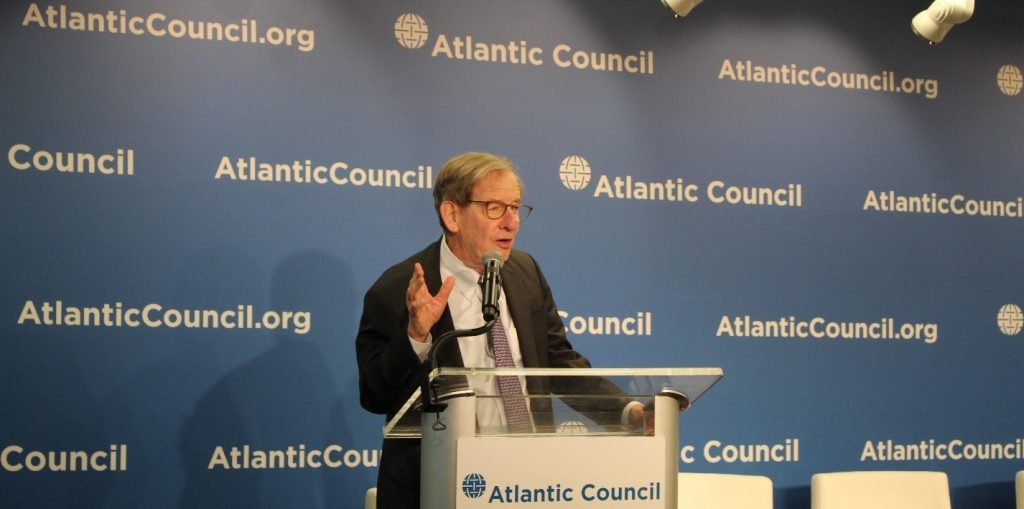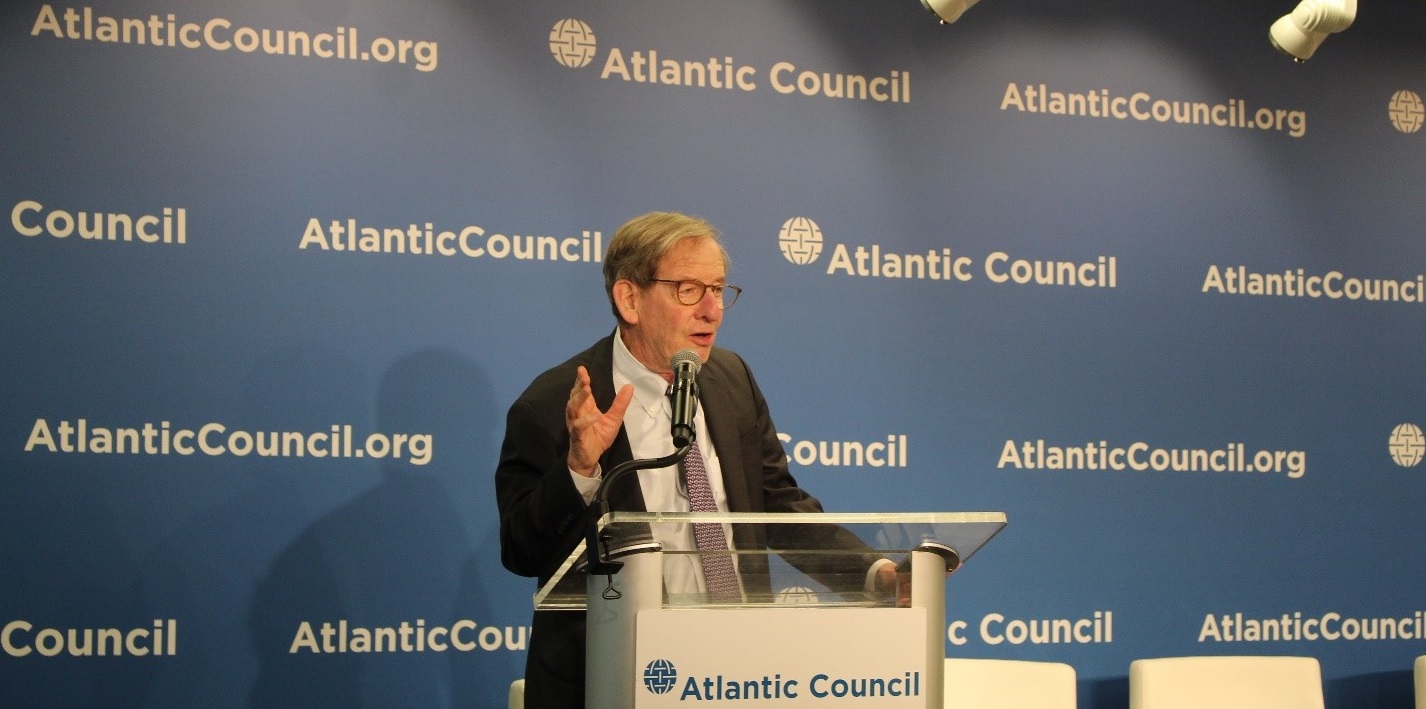
On June 26, 2019, the Atlantic Council Global Energy Center hosted the Fifth Annual Central and Eastern European Energy Security Conference, bringing together leaders and energy policy makers from across the region. The event consisted of three panels: “A Platform for US-Europe Cooperation on Energy Security,” “Strengthening Transatlantic Energy Security Through Innovation,” and “A Path to Energy Independence in Central and Eastern Europe.” Amb. Richard Morningstar, founding chairman of the Global Energy Center, offered introductory remarks stressing the interplay between energy, political, and economic security, as well as the importance of European energy security to the United States and transatlantic cooperation going forward.
He then introduced H.E. Ivan Korčok, ambassador of the Slovak Republic to the United States, whose remarks focused upon the recent successes of the Visegrád group—the Slovak Republic, the Czech Republic, Hungary, and Poland—in democratizing and modernizing their economies. Ambassador Korčok also spoke about the importance of US-Europe cooperation and achieving energy independence in Central and Eastern Europe (CEE). He also commented on the recently strained relationship between the United States and Europe, but focused on energy policy and cooperation as a success nonetheless.
After Ambassador Korčok’s remarks, the first panel, focusing on US-European cooperation on energy security and moderated by Emily Meredith of Energy Intelligence, began. Panelists included: H.E. Václav Bartuška, ambassador-at-large for energy security for the Czech Republic; Colin Cleary, director of energy diplomacy for Europe, the Western Hemisphere, and Africa in the Bureau of Energy Resources at the US Department of State; Albert Nahas, vice president of international affairs at Tellurian Inc.; Paweł Pikus, deputy director of oil and gas in the Ministry of Energy of the Republic of Poland; and H.E. Pál Ságvári, ambassador-at-large for energy security in the Ministry of Foreign Affairs and Trade of Hungary.
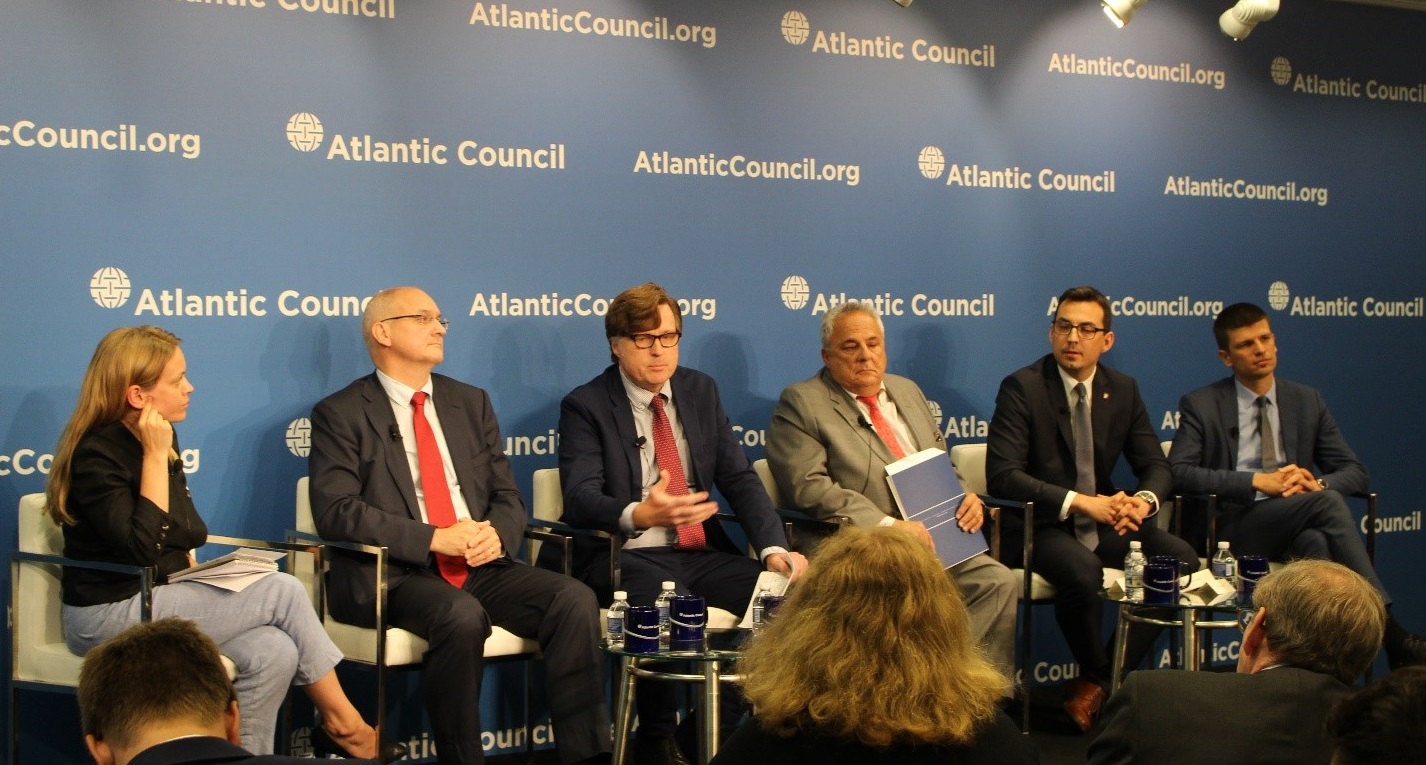 (L to R) Emily Meredith. H.E. Václav Bartuška, Colin Cleary, Albert Nahas, Paweł Pikus, H.E. Pál Ságvári discuss and debate current energy trends and developments, as well the importance of transatlantic engagement for European energy security.
(L to R) Emily Meredith. H.E. Václav Bartuška, Colin Cleary, Albert Nahas, Paweł Pikus, H.E. Pál Ságvári discuss and debate current energy trends and developments, as well the importance of transatlantic engagement for European energy security.
Meredith asked a series of pointed questions regarding each panelist’s position and experience related to energy independence, carbon emission reductions, fuel switching, and energy diplomacy. Most panelists agreed that energy source diversification was more important to energy security than independence; H.E. Bartuška pointed to the recent contamination of Russian oil as evidence that states must avoid relying on a single energy supplier—Russia or otherwise. H.E. Ságvári and Pikus both stressed the need for increased interconnection in the region, particularly through gas and electricity interconnections and reduced or eliminated border tariffs. Cleary similarly stressed the United States’ support for cooperative arrangements and interconnection in the region that would create a more competitive gas market and encourage transparent supply chains. All panelists agreed on the value of natural gas in cutting carbon emissions through fuel switching away from solid fuels, mostly coal. Though panelists were divided on revising emissions targets for Europe, as Pikus was concerned about the economic strain of raising target ambition, they all supported emission reductions. H.E. Bartuška, Pikus, and H.E. Ságvári all demonstrated support for cutting emissions as fast as possible through fuel switching, but also expressed concern that their countries would be able to meet their targets on schedule. H.E. Ságvári said that meeting targets would be impossible without nuclear energy, which comprises 40 percent of his native Hungary’s energy mix. Nahas agreed with other panelists’ regarding the importance of supplier diversification, and stressed the need for a regulatory framework for gas imports and a more integrated Europe that would allow for the free flow of energy commodities and create a more competitive market.
Following the panel discussion, Meredith took audience questions, which delved further into European energy independence from Russia, US investment in European energy infrastructure, and how European natural gas demand will change going forward. Amb. Morningstar also asked the panel if their countries would apply a security premium to imported LNG if it gave them a second source of supply; panelists answered that they would pay for LNG infrastructure to diversify their supply, but would not pay more for the commodity itself.
The second panel covered energy security innovations in the region, with a focus on government-led incentives to facilitate private investment. Olga Khakova, associate director for European energy security at the Atlantic Council Global Energy Center, moderated the panel. Speakers included András Bácsi-Nagy, head of international public affairs and European Union regulatory affairs at the MOL Group; Lee Beck, a women leaders in energy fellow at the Atlantic Council Global Energy Center and senior advocacy and communications adviser for the Global CCS Institute; Artur Bobovnický, director of innovations and international cooperation at the Slovak Innovation and Energy Agency; and Patrik Krizansky, managing partner at Danubia NanoTech.
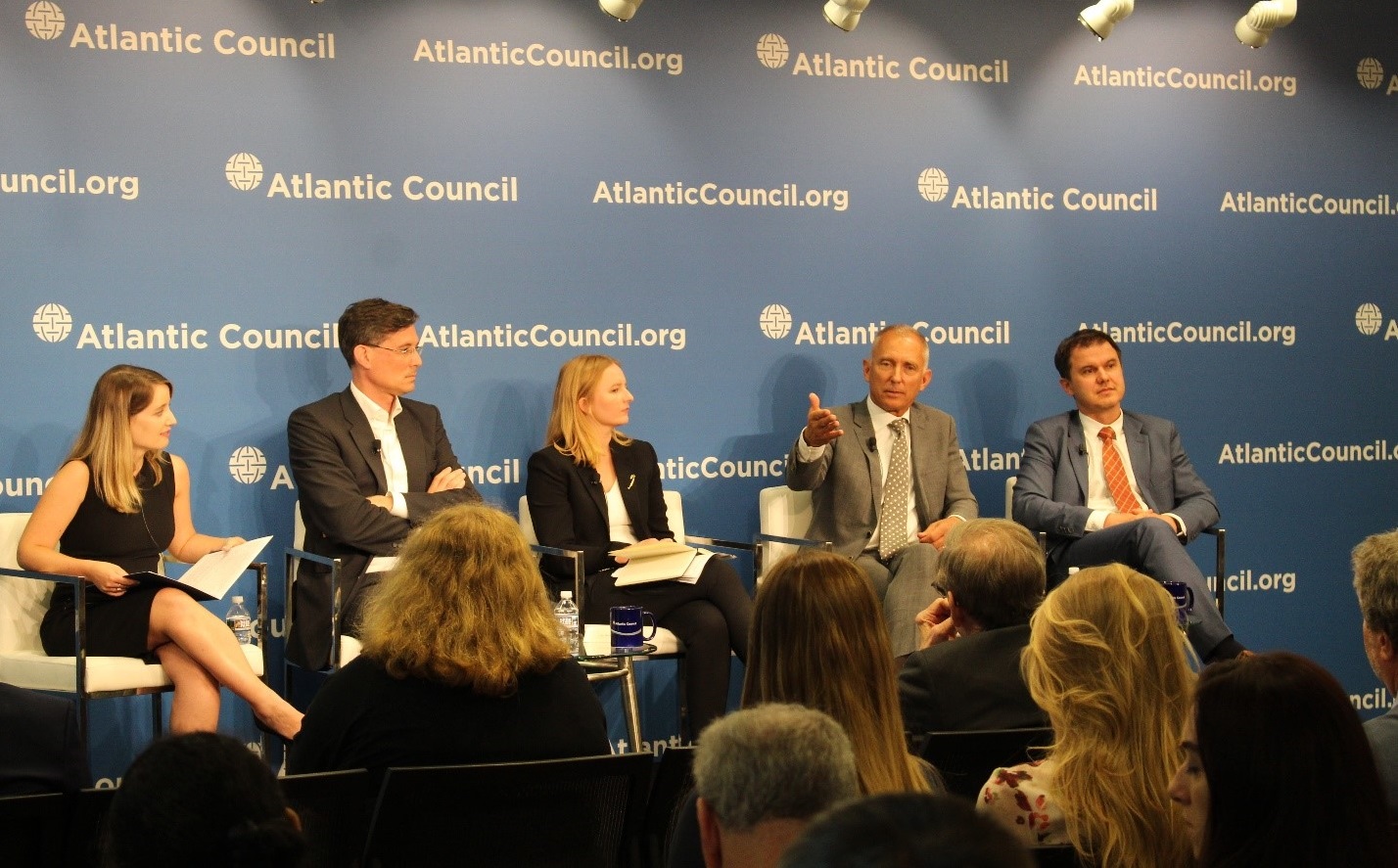
(L to R) Olga Khakova, András Bácsi-Nagy, Lee Beck, Artur Bobovnický, Patrik Krizansky discuss transatlantic cooperation on energy innovation in the Central and Eastern European regions, and its impact on European energy security.
Encouraging the most efficient forms of innovation requires a careful balance of public and private investment. In Europe, governments often do not sufficiently support research and development, with countries like Sweden dedicating less than six percent of government spending to technological research and development. Deployment incentives are required for new technologies to grow, with panelists citing the EU Innovation Fund and Horizon 2020 as successful derisking initiatives for private companies looking to maximize profit, especially carbon capture and storage (CSS), a negative emission technology often heralded as a vital component of any decarbonized future. Panelists agreed that the time to deploy CCS is now, but that there is little economic incentive to leave the profitable natural gas business behind for a risky, albeit necessary, innovation. Bobovnický believed that educating younger generations about energy efficiency, green technologies, and entrepreneurship is the best use of government funding. Increased efficiency leads to reduced spending on decarbonization, freeing up financial resources for important research and development.
The final panel of the afternoon highlighted energy independence in Central and Eastern Europe. To begin, Klaus-Dieter Borchardt, deputy director-general for energy at the European Commission, delivered brief remarks emphasizing the need for cooperation on natural gas infrastructure and market rules. Amb. András Simonyi, senior fellow at the Atlantic Council Global Energy Center, then kicked off the panel discussion as moderator. In addition to Borchardt, the panel consisted of Barbara Dorić, managing director of Croatia LNG; H.E. Juraj Siváček, ambassador-at-large for energy security for the Slovakian Ministry of Foreign Affairs; and Christopher Smith, senior vice president for policy, government, and public affairs at Cheniere Energy, Inc.
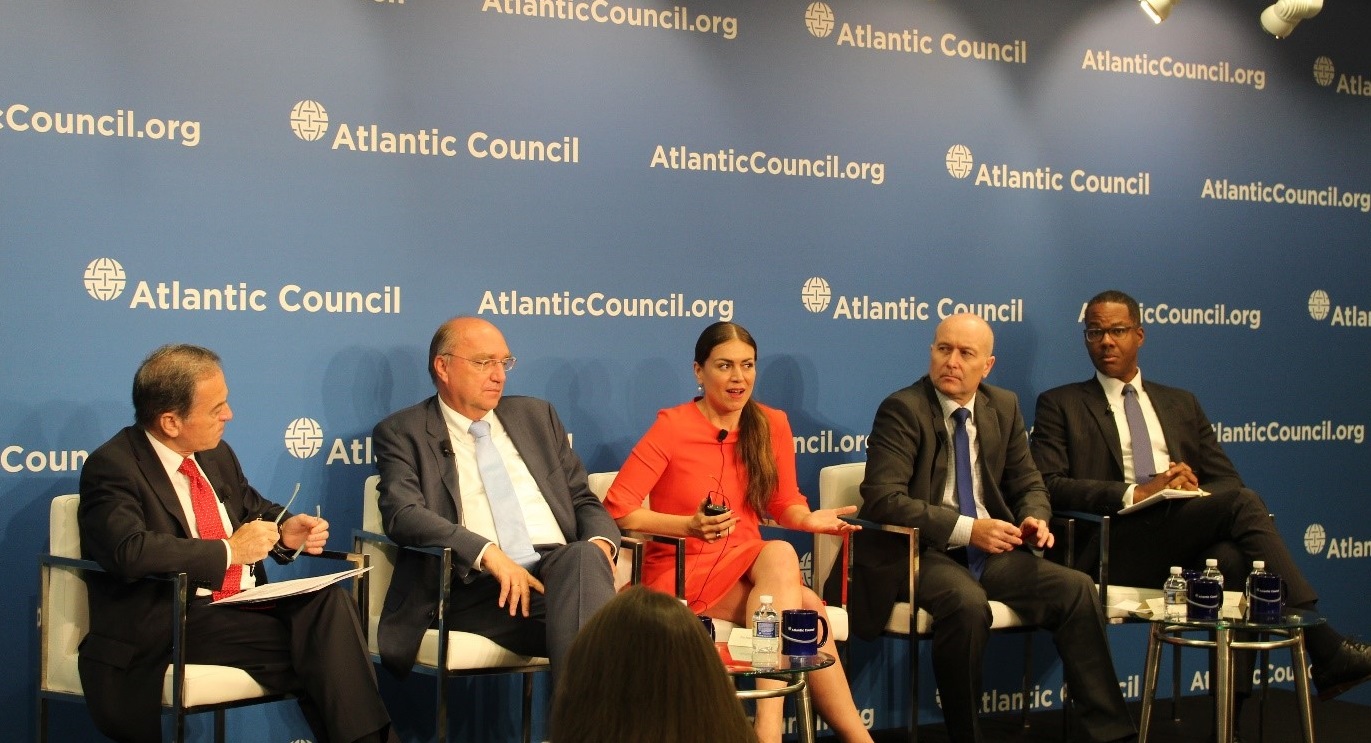 (L to R) Amb. András Simonyi, Klaus-Dieter Borchardt, Barbara Dorić, H.E. Juraj Siváček, Christopher Smith talk about the ongoing movement towards energy independence in Central and Eastern Europe.
(L to R) Amb. András Simonyi, Klaus-Dieter Borchardt, Barbara Dorić, H.E. Juraj Siváček, Christopher Smith talk about the ongoing movement towards energy independence in Central and Eastern Europe.
The CEE region is working on a multitude of new natural gas pipeline projects, with goals of generating greater market variety and achieving regional energy independence. Panelists emphasized that the era of large, single-supplier pipelines is over, with each country aiming to have at least three unique sources of supply. While new projects such as the LNG terminal on the Croatin island of Krk and the BRUA/BRUSKA pipeline are reducing regional dependence on Russian energy and creating an interconnected energy network in the region, Russia will remain a dominant supplier as Turk Stream and Nord Stream 2 come online. Panelists agreed that improved energy infrastructure is vital, with only Russia benefitting from a disconnected CEE region. The United States also plays a role, with Cheniere Energy’s Smith emphasizing the new US focus on producing and exporting LNG.
The event concluded with remarks by H.E. Juraj Siváček and Amb. Richard Morningstar, who provided a final overview addressing the importance of energy independence and sustainability.
To watch the event, check out the conference webcast here.
Image: Amb. Richard Morningstar delivers introductory remarks at the Atlantic Council's Fifth Annual Central and Eastern European Energy Security Conference.
